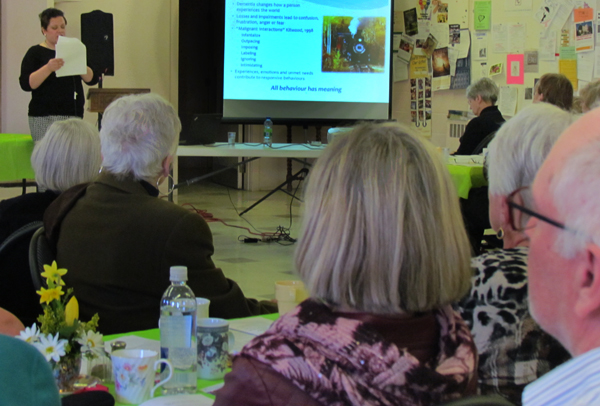New unit at QHC to help dementia patients
Sue Capon | Apr 15, 2015 | Comments 0

Adrienne Bell-Smith speaks about the new BSTU to attendees at the Hospital Auxiliaries Association of Ontario Spring Conference, hosted by the PEC Memorial Hospital Auxiliary.
The number of older adults with dementia or age-related brain dysfunction is growing in the region – estimated to number about 10,000 in south eastern Ontario – and most, at some point, will experience “problematic behaviour” that can escalate in a traditional hospital setting.
Upon opening March 26, the first four patients have been admitted to a new ‘Behavioural Supports Transition Unit’ (BSTU) at Belleville hospital, designed to support those living with dementia, and their families, who have exhausted use of local resources.
Members of the Prince Edward County Memorial Hospital Auxiliary, hosting the spring conference for the Hospital Auxiliaries Association of Ontario on Wednesday, learned about the new unit during a presentation from QHC’s Adrienne Bell-Smith, BSTU program manager.
“People with dementia need a supportive environment to meet their needs,” said Bell-Smith. “Like us, they still need to share, love, give, feel competent, belonging, useful, successful and to feel hopeful… This unit will help patients approaching or at the peak of dementia behaviours. It’s a progressive condition that peaks, then often tapers off as they age.”
The BSTU is a 20-bed inpatient program for adults living with dementia or age-related cognitive impairments who need enhanced resources to help manage challenging behaviours that are often a part of these conditions,” Bell-Smith explained.
Wandering, agitation, anxiety, aggressive behaviour and inappropriate sexual touching can all be part of responses these patients have to how they are experiencing their new world.
“Who hasn’t experienced impatience, frustration and anger sometimes when we couldn’t get what we need?”
The BSTU program is designed to find out what need is not being met and is creating or triggering behaviours. Triggers include being treated like a child, moving or speaking too quickly, ignoring needs, intimidation, unmet needs, infection and emotions.
It is a regional service for seniors in South Eastern Ontario hospitals, long-term care homes, retirement homes and community settings. Intake is being managed by the South East Community Care Access Centre.
Two years in development, QHC worked in partnership with the South East Community Care Access Centre (CCAC), long-term care home representatives and Providence Care. Four patients have been admitted since it opened March 26.
The interprofessional BSTU team is tasked with developing behavioural care plans that will assist in the management and stabilization of responsive behaviours that can be handed over to and carried out by teams outside of the hospital setting.
“The team will be working closely with individuals admitted to the unit, their family, caregivers and health care partners in order to successfully transition the individuals to their most appropriate care setting,” Bell-Smith said. “The goal is to figure out a care plan or set of strategies for the person that will work in thier destination. – their home, a long term care home, or other destination. The anticipated length of stay for each patient is approximately 90 days but will be determined based on their needs.”
Bell-Smith said Sills 4 is an ideal space for the program as it was designed specifically to be as homey as possible, soothing, senior friendly and dementia friendly – something that may be looked at to roll out into other parts of the hospital.
Admission Criteria:
– Age-related cognitive impairment and those who need help managing responsive behaviours that are often part Alzheimer’s and the various forms of dementia.
– Behavioural health needs that currently exceed available resources for example, the Alzheimer Society, CCAC or community-based behavioural support services.
– Health issues that can easily be managed in home or in a community setting.
Filed Under: Local News
About the Author:
































